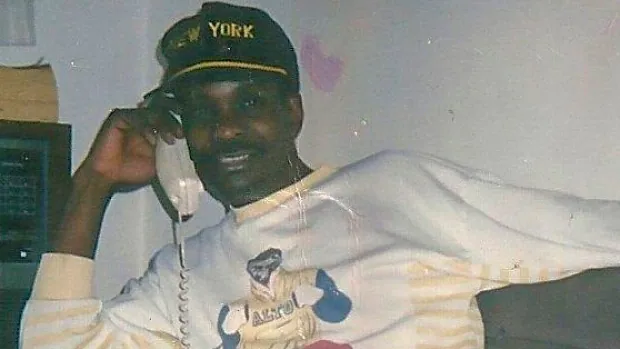A report by Quebec’s coroner’s office into the 2017 death of Pierre Coriolan, who was shot and killed by Montreal police while in the midst of a mental-health crisis, has found that officers lack sufficient training to de-escalate and communicate, and they were relying on “outdated” and “obsolete” techniques.
Coriolan, a 58-year-old Black man, was shot by police in his apartment building in Montreal’s Gay Village on June 27, 2017. Police were responding to 911 calls about a man in distress, yelling and smashing things in his apartment.
A total of six police officers responded to the call. The officers testified at the coroner’s inquest that they found Coriolan sitting on his couch, holding a knife and a screwdriver.
Officers testified that after yelling at Coriolan to “drop the knife,” they shot him with a Taser and rubber bullets before firing three gunshots when he moved toward them.
A pathologist’s report found Coriolan was shot three times and died from a hemorrhage in his abdomen. He also suffered blunt-force trauma.
‘Obsolete’ training
In his 33-page report, coroner Luc Malouin found that the six officers who responded to the shooting “provoked a chain reaction” by the way they approached Coriolan and that key information that could have affected their response was not properly disseminated.
The 911 dispatcher had relayed to police that the man was in mental distress, but Malouin said the information that Coriolan was likely alone in his apartment was not transmitted on police radio.
Malouin noted that only one of the officers, Sgt. Jimmy-Carl Michon, had the information that Coriolan was likely alone, but he did not relay this information to the other officers.
The coroner said that when officers arrived and found Coriolan sitting on his couch, they should have adopted a defensive position and that only one officer should have communicated with Coriolan to avoid confusing instructions.
The report also concluded that officers were relying on “obsolete” training on rapid intervention tactics, which was developed following the Polytechnique massacre in 1989.
“This training is founded on the principle that police officers must intervene rapidly to isolate and control a person who presents a threat to themselves or to others, generally an active shooter,” wrote Malouin.
“Unfortunately, this training is obsolete and outdated, because it doesn’t take into account the mental state of the person in crisis and the importance of acting differently toward this clientele.”
Malouin noted that police had to react quickly, during an intervention that lasted only minutes.
“They did not have the luxury that we have of taking several hours to analyze the situation,” Malouin wrote.
But Malouin also cited the testimony of two experts in the use of force, who both stated that the police operation should have been carried out more slowly.
“The mere presence alone of people in uniform can provoke an escalation of the crisis. It’s important to take one’s time all throughout the action,” Malouin wrote.
Family ‘satisfied’ with report
During the coroner’s inquest, a former police officer who testified as an expert witness said police require better training in de-escalation techniques.
Malouin made 16 recommendations for police forces, the Public Security ministry, as well as Quebec’s police academy, the École nationale de police du Québec (ENPQ), regarding training for officers.
The recommendations include enhanced mandatory training on dealing with individuals in a mental-health crisis, a requirement that officers recertify yearly in de-escalation and communication techniques, and “consequences” for officers who fail this training.
Malouin, who made similar recommendations in his 2016 report into the death of Alain Magloire, another Black man in mental distress killed by Montreal police, says there have been some improvements in training, both at the police academy and within the Montreal police (SPVM).
But he says the SPVM expects it will take five years for all of its officers to receive training in mental-health crisis interventions, and even those who have received it lack follow-up training.
“It’s a bit like sending Olympic skaters on the ice for a course, when it’s been a year since you’ve trained them. It just doesn’t makes sense,” Malouin said in an interview with Radio-Canada.
He says it is essential that police receive this training on a continual basis, as the SPVM alone responds to 1,000 calls a week about people in mental distress.
Malouin’s report also recommends further training for 911 operators on interventions involving people in mental distress.

Through their lawyer, Coriolan’s family members said they were satisfied with the report. Coriolan’s sisters are suing the City of Montreal for their brother’s death and will be back in court in May.
In a statement, Yves Francoeur, the president of Montreal’s police union, the Fraternité des policiers et policières de Montréal, said the union supports the coroner’s recommendations, particularly the addition of a minimum number of hours of continual training for officers, in collaboration with the ENPQ.
“Being a police officer in Montreal is becoming more and more complex, and putting an emphasis on training is essential,” Francoeur’s statement reads.
A spokesperson for Montreal Mayor Valérie Plante agreed that police need enhanced training and pointed to the pilot project for the Équipe mobile de médiation et d’intervention sociale (ÉMMIS), a specialized team that includes social intervention workers who respond to calls about people in psychological distress in public spaces downtown.
The coroner’s inquest came after prosecutors decided not to pursue criminal charges against the officers, following an investigation by the province’s police watchdog, the BEI.
The report was delayed by the onset of the COVID-19 pandemic.


